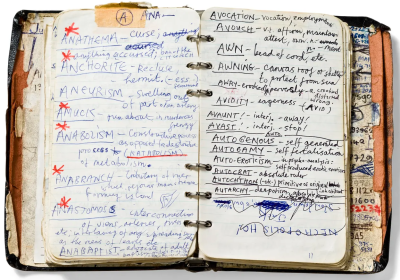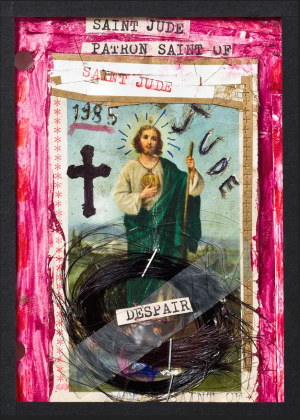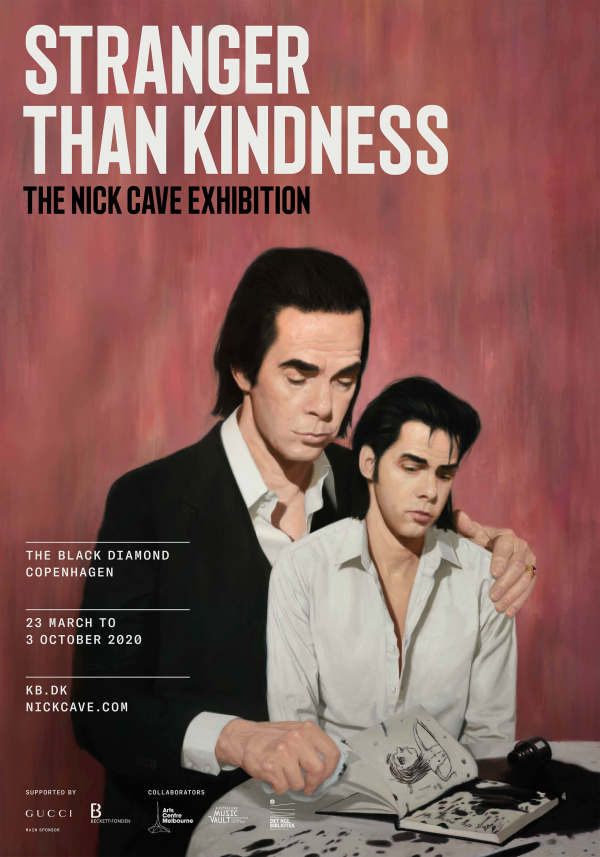VICE: It felt like an extravagant gift from my past self when Stranger Than Kindness showed up in the mail. It’s an odd and substantial object—part art book, part memoir, part jigsaw artifact—by and about Nick Cave, designed to complement an exhibit about his work at the Royal Danish Library in Copenhagen. (The exhibit is described by the curators as eight rooms devoted to “a spatial, multi-sensory exploration of his many real and imagined universes.”)
Like everything else, the exhibition is now indefinitely postponed, but the book more than stands on its own. Cave, who fled Australia for London and Berlin as soon as he came of age, became famous for his work  with the Birthday Party and then the Bad Seeds, which quickly became two of the most influential post-punk bands in the world. That vague descriptor doesn’t do much to describe their appeal, a crashing intersection at the crossroads of brooding, gothic imagery and music that’s by turns mournful, savage, and lustful.
with the Birthday Party and then the Bad Seeds, which quickly became two of the most influential post-punk bands in the world. That vague descriptor doesn’t do much to describe their appeal, a crashing intersection at the crossroads of brooding, gothic imagery and music that’s by turns mournful, savage, and lustful.
Cave has become known as the towering king of snarling melancholy, and Stranger is a pastiche that seems to get at his essence. It features his lurid, bizarre, beautiful, touching artwork and handmade books; photos from his life; and notebooks and scraps of paper that show him puzzling out his most famous songs, showing little glimpses of alternate history, verbal garden paths he chose not to go down (what if the tender, spiteful love song “Far From Me” had gone a little further, describing a departed lover as running like a dog?). It has moments both high and low: The handmade books often have a religious element, the Madonna and Child featured over and over, but there’s also a hand-drawn flyer of Cave as a nude, penitent, weeping, anatomically correct angel, clearly from his famed wilder years, advertising a shirt he sold to pay the damages for a hotel room he apparently wrecked.
All of that would be absorbing for a Cave devotee, as I clearly am. But anchoring the book, and giving it far broader appeal, is an exquisite, winding essay by the American novelist Darcey Steinke. The essay is, simply put, extraordinary, particularly for anyone who does any kind of creative work. It’s not entirely—or even mostly—about Nick Cave, but instead begins with Faulkner, and takes detours through Elvis and Graceland, Johnny Cash, sin, angels, Jesus, and resurrection day before landing, gracefully and sideways, into Cave’s work. MORE
THE GUARDIAN: What you see in this book lives in the intricate world constructed around the songs, and which the songs inhabit,” writes Nick Cave in his introduction to Stranger Than Kindness. “It is the material that gives birth to and nourishes the official work.”
That intricate world includes drawings, lists, collages, scribbled notes and lyrics, found photographs and several handmade books, creased and stained, sometimes in his own blood. Therein the sacred and the profane, the biblical and the pornographic, exist side by side as they have done in Cave’s songs for about 40 years  of often frantic creativity. There are pin-ups alongside devotional images of saints, sketches of nude female torsos alongside portraits of the madonna, and there are hand-written, home-made dictionaries listing arcane words, such as anchorite (a recluse), and autogamy (self-fertilisation).
of often frantic creativity. There are pin-ups alongside devotional images of saints, sketches of nude female torsos alongside portraits of the madonna, and there are hand-written, home-made dictionaries listing arcane words, such as anchorite (a recluse), and autogamy (self-fertilisation).
Cave calls it the “peripheral stuff”, which is “the secret and unformed property of the artist”, but here on the page it takes on a life of its own, revealing his often compulsive way of working, as well as his abiding interests and obsessions: desire, faith, sin, despair, redemption, grief, love, and the transformative thrust of language itself. MORE
PREVIOUSLY: If you heard a distant rumble or saw a flash of light on the Northwest horizon last night around 9 p.m., that was Nick Cave, like a bat out of hell, smiting Glenside to a crisp as per his satanic majesty’s request. And it was good. Very good. How could it not be? Everyone knows Heaven has better weather but Hell has all the best bands. Cave looked and sounded in peak form (good hair, great suit, whipped himself about the stage like an electrocuted Elvis), and his voice contained multitudes. Deep, dulcet, and strong like bull. Part angel-headed hipster, part Pentecostal preacherman, part medicine show barker, part lounge singer lothario. All pomade and sweat and jive and Old Testament gravitas. MORE

